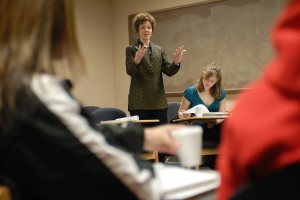
Hesston College ranks near the top nationally in categories of student learning and engagement among small two-year colleges in the U.S., according to a recently-released report. And student learning continues to improve at Hesston, thanks to the ongoing use of assessment tools.
The Community College Survey of Student Engagement (CCSSE), based at the University of Texas at Austin, last month released a report which included findings from a survey of more than 343,000 students on 585 community college campuses in 48 states. The goal of the survey administered in the spring semester of 2007 by Hesston College and the other institutions is to help colleges assess the quality of education their students receive.
The survey examined five categories that CCSSE determined to be important factors that affect learning-active and collaborative learning, academic challenge, student-faculty interaction, student effort, and support for learners. At Hesston, which was grouped with other small two-year colleges, 244 students took the survey, in 21 different classes selected by CCSSE to provide a random sample. The survey looks at academics, student life, financial aid, and in general, how well students are engaged. CCSSE selects classes from the college to reflect the underlying student population of the participating colleges in terms of gender and race/ethnicity.
“We learned that we are doing outstanding work in two categories,” Nelson Kilmer, science faculty member and an associate dean who helps the college evaluate and interpret assessment data, pointed out. “The results show that Hesston College scored at the 95th percentile (a nationally-normed percentile) in the category of “active and collaborative learning.” Kilmer explained that the category explores group learning inside and outside the classroom. “That means that only five percent of small two-year colleges are doing better than we are.”
In the “support of learners” category, Hesston College scored at the 92nd percentile. “That means we provide excellent support in the classroom, plus dorm support and social life on campus,” Kilmer said.
The CCSSE report was positive for Hesston College in most regards, with the college scoring at the 80th percentile for “academic challenge” and at the 74th percentile in “student-faculty interaction,” while “student effort” was scored at the 33rd percentile.
Sandra Zerger, vice president for academic affairs, said that the CCSSE survey results also dovetail with other assessment tools the college has been using, including a national IDEA (Individual Development and Educational Assessment) survey that has been given at the end of the past four semesters, beginning in the fall semester of 2006.
“The data are pretty much the same from the CCSSE and IDEA surveys,” she said. “We apprised the faculty of the challenges in the ‘student effort’ category and used the survey information to make improvements in teaching processes. We’ve provided faculty development and encouragement that has resulted in students learning more, according to subsequent IDEA surveys. We’ve made huge progress in four semesters.
Kilmer added, “We’ve worked on the category of ‘student effort’ for two years and have improved 14 percentile points according to the IDEA survey, scoring at the 47th percentile last spring.” The four other categories have significantly improved as well.
“The bottom line is that we’re using assessment to improve the education of our students,” Zerger said. “Faculty see assessment as a positive tool to improve learning. At a lot of colleges, assessment is perceived by faculty in a negative way. They feel threatened, rather than seeing assessment as a way to help them improve. Our faculty are proud of what they’ve done and what’s happening with student learning at Hesston.”
“We are developing a culture of assessment here,” Zerger continued. “The public is demanding more accountability, as well as accrediting agencies, and we are responding. For quite some time, we’ve given alumni surveys, and faculty have assessed their own courses every three years. Now, in the past five years, we’ve instituted three types of assessment-CCSSE, IDEA, and SSI (Student Satisfaction Inventory). And we’re not only doing assessment, we’re seeing improvement.”
“Hesston College is a two-year college,” Zerger said, “but we’re not a community college,” she emphasized.
She noted that Hesston College is a residential college that emphasizes the liberal arts even in its career programs (such as nursing and aviation), and that about 75 percent of students transfer to a four-year college or university.
“Hesston is faith based,” she continued. “Some people take that for granted, but Mennonite faith emphasizes service and community, both of which address student engagement and make a big difference.”
Kilmer noted that the CCSSE report showed that smaller colleges succeeded better at student engagement. “We are a small school and size is an advantage,” he said. “We can interact more easily with students, support them in a more personal way, and we’re better able to develop a sense of community, which is important.”

